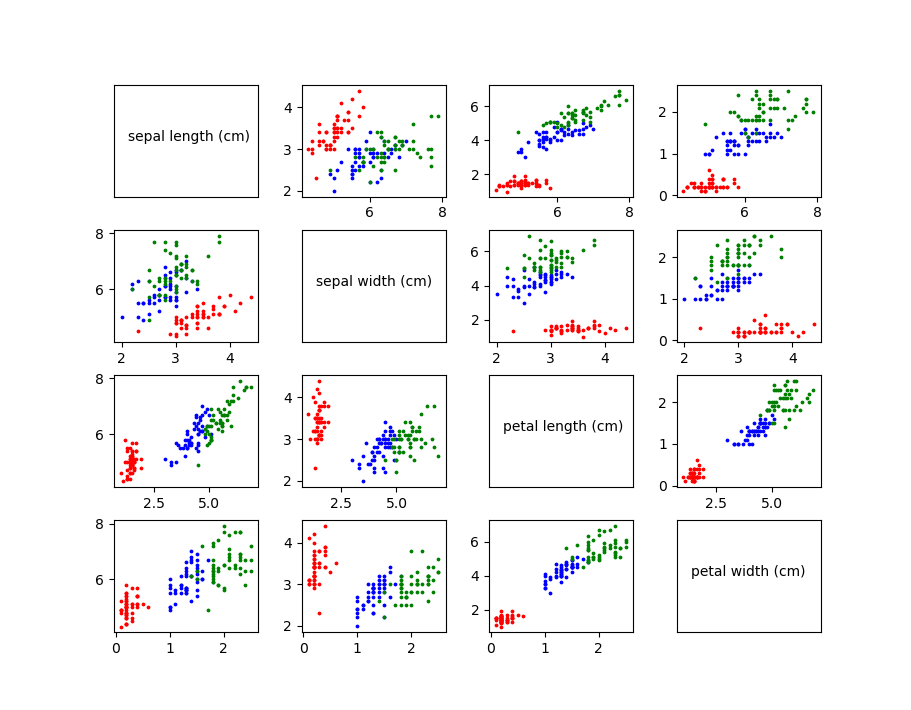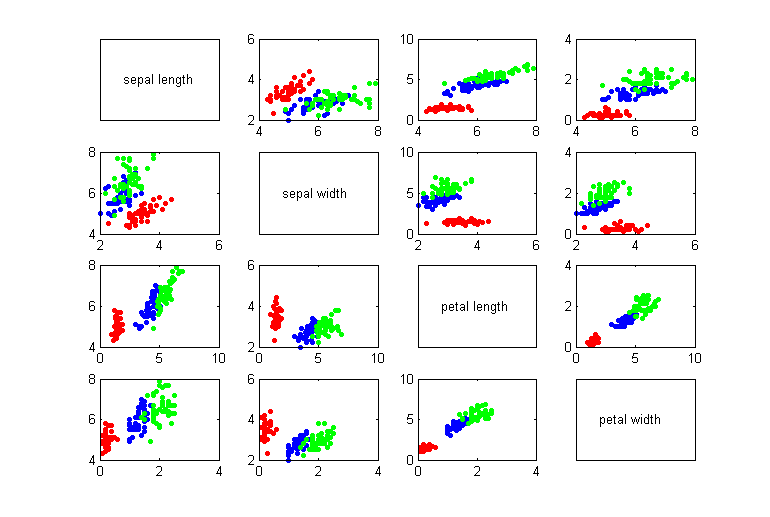1 python 实现
加载数据集
IRIS 数据集在 sklearn 模块中已经提供。
# -*- coding: utf-8 -*-
from matplotlib import pyplot as plt
import numpy as np
from sklearn import tree
from sklearn.datasets import load_iris
if __name__ == '__main__':
print('\n\n\n\n\n\n\n\n\n\n')
# show data info
data = load_iris()
print('keys: \n', data.keys()) # ['data', 'target', 'target_names', 'DESCR', 'feature_names']
feature_names = data.get('feature_names')
print('feature names: \n', data.get('feature_names'))
print('target names: \n', data.get('target_names'))
x = data.get('data')
y = data.get('target')
print(x.shape, y.shape)
print(x)
print(data.get('DESCR'))
可视化数据集
# visualize the data
f = []
f.append(y==0)
f.append(y==1)
f.append(y==2)
color = ['red','blue','green']
fig, axes = plt.subplots(4,4)
for i, ax in enumerate(axes.flat):
row = i // 4
col = i % 4
if row == col:
ax.text(.1,.5, feature_names[row])
ax.set_xticks([])
ax.set_yticks([])
continue
for k in range(3):
ax.scatter(x[f[k],row], x[f[k],col], c=color[k], s=3)
fig.subplots_adjust(hspace=0.3, wspace=0.3) # 设置间距
plt.show()

分类和预测
# 划分训练集和测试集
num = x.shape[0]
ratio = 7/3 # 训练集数目:测试集数目
num_test = int(num/(1+ratio))
num_train = num - num_test
index = np.arange(num)
np.random.shuffle(index)
x_test = x[index[:num_test],:]
y_test = y[index[:num_test]]
x_train = x[index[num_test:],:]
y_train = y[index[num_test:]]
# 构建决策树
clf = tree.DecisionTreeClassifier()
clf.fit(x_train, y_train)
# 预测
y_test_pre = clf.predict(x_test)
print('the predict values are', y_test_pre)
计算准确率
# 计算分类准确率
acc = sum(y_test_pre==y_test)/num_test
print('the accuracy is', acc)
由于数据集的划分是随机的每次得到的准确率都不一样,一般位于91%-97%之间。
2 基于MATLAB 实现
Matlab 对数据的可视化

实现代码如下:
clc
clear all
close all;
load fisheriris;
x = meas;
y = species;
class = unique(y);
attr = {'sepal length', 'sepal width', 'petal length', 'petal width'};
ind1 = ismember(y, class{1});
ind2 = ismember(y, class{2});
ind3 = ismember(y, class{3});
s=10;
for i=1:4
for j=1:4
subplot(4,4,4*(i-1)+j);
if i==j
set(gca, 'xtick', [], 'ytick', []);
text(.2, .5, attr{i});
set(gca, 'box', 'on');
continue;
end
scatter(x(ind1,i), x(ind1,j), s, 'r', 'MarkerFaceColor', 'r');
hold on
scatter(x(ind2,i), x(ind2,j), s, 'b', 'MarkerFaceColor', 'b');
hold on
scatter(x(ind3,i), x(ind3,j), s, 'g', 'MarkerFaceColor', 'g');
set(gca, 'box', 'on');
end
end
ratio = 7/3;
num = length(x);
num_test = round(num/(1+ratio));
num_train = num - num_test;
index = randperm(num);
x_train = x(index(1:num_train),:);
y_train = y(index(1:num_train));
x_test = x(index(num_train+1:end),:);
y_test = y(index(num_train+1:end));
tree = fitctree(x_train, y_train);
y_test_p = predict(tree, x_test);
acc = sum(strcmp(y_test,y_test_p))/num_test;
disp(['The accuracy is ', num2str(acc)]);